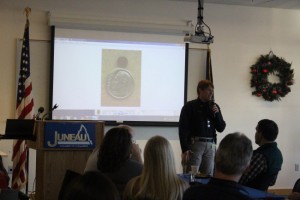Legislators, police officers and behavioral health specialists will gather this weekend in Juneau for a town hall discussion on heroin. They’ll be focused on finding local solutions to help people suffering with addiction.
Michele Morgan started Stop Heroin, Start Talking as a grassroots initiative — a homespun way to get the word out about what she saw happening in her community. After throwing events and printing our flyers on her own dime, Morgan is now the one getting help.

Her organization recently partnered with the Juneau branch of the National Coalition on Alcohol and Drug Dependence.
“We realized that what Juneau Stop Heroin was doing is exactly what NCADD wanted to start doing more of,” Morgan said.
NCADD provides advocacy, education, and some clinical services. Being under the umbrella of the nonprofit means donations to Stop Heroin, Start Talking will be tax deductible. It also connects the organization to a slew of other agencies that NCADD has developed partnerships with, such as the California-based Harm Reduction Coalition.
Katie Chapman, executive director of the Juneau’s NCADD, said her organization saw the work Morgan was doing and thought it would be a good fit.
“It’s amazing. It’s really inspiring to see that. I think a lot of change happens from individuals, community members that have the passion,” Chapman said.
For Sunday’s community meeting, Morgan invited Juneau representatives Sam Kito and Cathy Muñoz to weigh in on the Good Samaritan law and Senate Bill 23.
“All I did was email these people and they responded and said, ‘yes I will do this.’ That is a testament to how forward thinking Juneau is getting to be. It’s great,” Morgan said.
The Good Samaritan law passed last year. It protects people who report an overdose from criminal prosecution. SB 23 could prevent deaths by holding harmless those who administer a drug called Naloxone in an attempt to save someone who has overdosed
Another topic at the meeting will be the lack of treatment options for people who want to get clean. There’s practically nowhere to clinically detox in Juneau.
“I hope it’s not adversarial, but it is something that sticks in your head. We can arrest someone for using drugs and put them in jail immediately. But if we want to put them in treatment, which I think is fiscally and for our future more responsible, we don’t have beds.”
City Manager Kim Kiefer has been looking into a program in Gloucester, Massachusetts that helps people get into treatment. She learned that it costs about $50 to connect someone with services and about $230 to incarcerate them.
Like Juneau, Gloucester is a small town of about 30,000. The town is about an hour outside of Boston, and people suffering with an addiction there can go to a police department and ask for help. Then they can get into a detox program and long-term treatment.
“In the six months they’ve been doing this, they’ve had over 300 people that say, ‘I want to get clean,’” Kiefer said.
Kiefer says she doesn’t know much about heroin addiction, but she’s trying to learn more. That means reaching out to people in and outside of Juneau to find what’s working.
More than $800,000 of the city’s social service funds are funneled through the Juneau Community Foundation. The Hope Foundation is pitching in $1 million for grants to look into these issues.
For Morgan — the woman who started the Stop Heroin, Start Talking program — the biggest hurdle has been changing attitudes about addiction, including her own. Three years ago, her sister died of a heroin overdose. She wrote in the obituary she died of cancer.
“My sister would have died this year, I would have said the truth. I would have said my sister Eva died after a long battle of addiction and I would feel fine. But three years ago we were ashamed. We didn’t want anyone to know or smudge her reputation,” Morgan said. “But now people are looking at it as it is a health crisis and in that sense, that’s the big change.”




